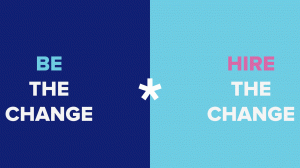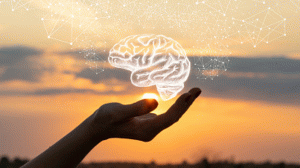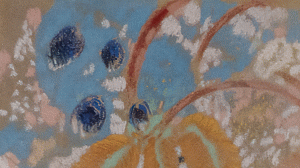I like to claim that I'm not superstitious. But honestly that's not really true. For example, I have a hard time accepting, it was a coincidence that on that fateful day 23 years ago I bought four CDs of four different bands during a sale in a record store - and on two of these CDs there was a vegan song each. That was anno 1999! The two singers of those bands probably made up a higher double-digit percentage of the entire vegan scene on the planet back then! And because the internet was rather insider at that time, one band advertised in their CD booklet a vegan catalog that could be ordered by mail, and described it with things like "non-violent lifestyle" and "cruelty-free feetwear". And even though I was familiar with veganism, and even though my younger sister had become a vegetarian a few years earlier after watching a documentary about factory farming, I first had to think about what they meant by that and what it had to do with our food and our shoes: violence. cruelty. But after I had this booklet in my hand for the first time I never ate animals again. And a few restless weeks later full of agonizing "actually I should" and "I can't reconcile that with my conscience" and "phew, but how is that supposed to work" I finally made the decision to also no longer accept milk and eggs as food for me - and felt infinitely relieved and pacified. The moral imperative had weighed heavily on me and the wrestling and struggling had come to an end.
I had not seen a documentary on factory farming. I was/am not an "animal lover" either; cat videos leave me cold, dog love is a mystery to me. But I was already very political at that time. The German red-green government had just decided to go to a war, about which I was highly indignant, and my commitment against this militarization at that time strengthened my identity as a pacifist. And that's where these two terms caught me: violence. cruelty. It was my political stance on human rights that brought me to animal rights at that time. And in the years that followed, it was also the other way around, back and forth. And rightfully so: these things are all interconnected.
Everything is interconnected. Tamam.
And theoretically, this is largely common sense. War, capitalism, exploitation, discrimination, climate crisis, poverty, famine - there is a system behind it.
Practically... it looks a little different, though.
I believe that most people in our society do not eat animals because it would be compatible with their values to eat them. But they eat animals, WHILE it is NOT compatible with their values. We know about factory farming, animal transports and cruel killing methods. We all disagree with that. That's why it's so important for people who eat animals to emphasize again and again that they eat only "very little", and if, then "only organic meat" (in reality, however, Germans underestimate their actual consumption of so-called meat products by no less than 71 percent, and the market share of so-called organic meat is just about 3 percent).
Many already know this has to do with cognitive dissonance. That's human too, when it comes to political issues that make us uncomfortable, we develop a lot of strategies that protect us from having to deal with them honestly and with integrity, so we can just leave things as they are. And with this issue, one of our main strategies is: We pretend that the human-animal relation is not a political issue.
There is virtually no systematic discussion of animal rights even in progressive political discourses around social justice. Animal rights are talked about in animal rights circles, nowhere else. This refusal to include animal rights in our understanding of social justice has to do once again with the patriarchy that has crept into all of our socialization, claiming exclusive rights to objectivity and neutrality, and rejecting anything that somehow smells of emotionality. And veganism and animal rights are thereby dismissed as somehow emotionalism with animals. And it is no coincidence that most people who live vegan are female.
This means, on the one hand, ignoring what eating animals has to do with capitalism, violence, and so many other hierarchies of exploitation and power that we reject, and denying that speciesism as a real category of discrimination on the basis of which the violent oppression of (certain) animals is justified by their species membership. And on the other hand, with devaluing empathy and care as factors in our political discourses.
The patriarchy in us makes us think: empathy distracts us, softens us, prevents us from looking clearly and objectively at an issue. And I say: Only real empathy enables us to be sincerely interested in the concerns and pain of our counterpart, to acknowledge his suffering as relevant even when we are well. Only empathy enables me to take animals seriously, even politically, as massive victims of systematic violence, exploitation and oppression, and to show solidarity with them.
Pity is not the same as empathy, and it is no coincidence with whom we have empathy and with whom we have pity. We have pity with those species that we categorize as farm animals, that's why we have the animal welfare label or the “Bruderküken” initiative (Bruderküken = brother chick). And so, as of this year, it is forbidden in German hatcheries to shred male chicks as an unprofitable "by-product" of the egg industry immediately after hatching; instead, they are now slaughtered "only" at 2-3 months of age. And we really think this is ethical progress! We do want to show consideration for our counterpart with whom we feel pity - but we want to determine for ourselves what that means. Our consideration is, on the one hand, optional and, on the other, attuned to the limits of our goodwill (!) and comfort zone, not to the actual concerns of those we pity. Pity does not find so relevant that these male chicks could actually live to be 10 years old. Pity comes from the top down.
Empathy, however, is based on equal worthiness. Equal worthiness does not necessarily mean equality. And, after all, I've written elsewhere about how I don't necessarily see equality as a solution to our societal problems. I find it more important to ask, "Who needs what?" Animal rights are not about press rights or voting rights, they don't need that. But the animals that end up on our plates would have run away and hid from us if we hadn't abused our power over them to violently prevent them from doing so. Animals are capable of happiness and they are capable of unhappiness. It is about the right to integrity, freedom and self-determination, about animals living in their own social structures, raising their children and simply doing their thing.
We know this. And we deny most of these rights and abilities only to those few species that we categorize as edible. And then, of course, there are those animals that we consider companions, that we live with, that we often even consider family members. We know: Our "pet" has its own individual personality, different from our last "pet", we take its needs for companionship, attention and play seriously, go to the vet when they are sick. Legally it is not much more than an object, but for us it is a person. That is why we find it repulsive, backward and uncivilized when other societies eat dogs or cats. And we don't see our own double standards, nor what racism has to do with it. But: This is no coincidence. Everything is interconnected. And therefore I know today naturally also that to live vegan still for a long time does not mean to live free of violence and cruelty.
Today it is obvious to me: Veganism needs the conscientious embedding in a social justice context, it needs privilege and discrimination sensitization. Veganism is not equally accessible to everyone and is not even possible for a (small) minority in our society. At the same time, any discourse critical of discrimination and power, that does not recognize animals as a massively discriminated group of people, and dethematizes veganism as an anti-discriminatory practice and lived critique of domination and power, disqualifies itself as a complete critique of the system. We will not do justice to a claim of "Leave no one behind" and real social justice for all if we behind animals.
November 1st is World Vegan Day. We've been celebrating it in our family for a few years now, a little empowerment act for my kids who have been vegan since birth. Nothing big, we eat vegan delights (I guess this year it will be, among other things, the new vegan frozen Donauwelle from a well-known frozen cake company) including a little gift. Maybe we'll also go to a farm sanctuary to say a quick hello to those people we don't eat, so it's always clear: veganism is not about nutrition. Our Veganism centers on caring for these living beings. And it's about how we want to be as humans and how this world needs to look so that it can truly be a just, peaceful place for everyone. It's about Belonging, about respect.
It's about all of us. Tamam.
---
In this column, presented in collaboration with our friends from Wildling Shoes, we want to give more space and visibility to the issues of anti-discrimination, belonging, and intersectionality in the workplace. Through articles, interviews, and diverse perspectives, we aim to both challenge and inspire those working in the impact sector - while encouraging them to create authentically lived workspaces that foster more belonging and less discrimination. By gaining new perspectives and engaging in a shared dialogue, we can take a collective step toward radical systems change in the impact sector - from "power over" and "power for" to "power with."
Our columnist for 2022 is Sohra Behmanesh. She lives with her family in Berlin, works as a freelance anti-racism trainer, and finds caring and empathy just as superb as intersectionality.
You can find more Belonging articles here.

Photo: Kris Wolf










